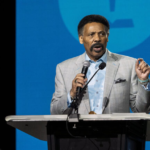In Brookland, the Catholic crowd of more than 1,200 were fervent about their faith, but it remains to be seen if the evangelizing project will reach beyond those already committed.

WASHINGTON (RNS) — On her 22nd day traveling across the United States, Natalie Garza broke off from the Eucharistic procession, bounded up the front steps of a Washington, D.C., home and handed an onlooker a card stamped with a QR code that would explain why a crowd of hundreds of Catholics like Garza had filled the street outside his home in the Brookland neighborhood of the nation’s capital.
Since May 17, the National Eucharistic Pilgrimage, a cross-shaped trek along four routes across the U.S., has been heading for Indianapolis, where tens of thousands of faithful are expected to take part in the National Eucharistic Congress, a five-day event aimed at increasing devotion to the sacrament at the heart of Catholic life. The congress will be a culmination of two years of diocesan and parish level programming, including more opportunities for adoration of the Blessed Sacrament.
Both the pilgrimage and congress are part of the National Eucharistic Revival, a three-year initiative launched by the U.S. bishops’ conference to educate Catholics about the Eucharist. Catholic doctrine teaches that Jesus is actually present in the bread and wine of the Eucharist, as opposed to some Protestant denominations that consider the Eucharist to be a commemoration of Jesus’ death and resurrection.
While most Catholics in the D.C. procession had joined the procession only for the day, Garza, a high school theology teacher at St. James Academy in Lenexa, Kansas, is one of six young adults, known as perpetual pilgrims, traveling the entirety of the pilgrimage’s St. Elizabeth Ann Seton route, walking 10 to 20 miles most days on the way from New Haven, Connecticut, to Indianapolis.
Garza, an alumna of Franciscan University of Steubenville, Ohio, said she was inspired to apply to be a perpetual pilgrim because she wanted to increase in her “lived experience of discipleship.”
“I knew that this was going to be one of the greatest movements in the American church up until this time, and I wanted to be a part of that. I wanted to walk with Jesus to intercede for America,” said Garza, who compared her pilgrimage experience to the life of the apostles.
Her hope, she said, was that the revival would bring Catholics in greater numbers to vocations to the priesthood as well as to married life. “I hope that this revival brings a renewed sense for all people that God desires them, and he will do anything to be with them,” she said.

In 2019, a Pew Research Center survey found that only 31% of U.S. Catholics believed in Catholic teaching about the real presence of Jesus in the Eucharist, raising alarm among bishops, but also drawing criticism from theologians and other pollsters who said the poll’s wording had likely skewed the data.
Along with concerns about flawed polling, the National Eucharistic Revival has faced criticism for drawing resources and attention from Pope Francis’ major consultative initiative, the Synod on Synodality, as well as for the revival’s $14 million cost and its often tchotchke-based brand of piety.
Subsequent polling in 2022 from Georgetown University’s Center for Applied Research in the Apostolate found that, while there was substantial confusion about Catholic teaching on the Eucharist and Catholic respondents did not consistently answer questions in line with Catholic doctrine, 64% did indicate that they believe in the real presence of Jesus in the Eucharist.
That same 2022 poll found that only 17% of U.S. adult Catholics were attending Mass weekly, part of a trend of decreased Mass attendance since the beginning of the COVID-19 pandemic.
Crookston, Minnesota, Bishop Andrew Cozzens, chairman of the board of the National Eucharistic Congress, has cited declining Mass attendance as an important reason a Eucharistic revival is needed, saying that if Catholics felt they encountered Jesus in the Eucharist, they’d be attending Mass weekly.
That seemed to be the experience of the 10 attendees of the Washington procession who spoke with Religion News Service, all of whom expressed deep devotion to the Eucharist and involvement in the church.
“I cannot do without the Eucharist,” said Appolonia Nnesolu, who took an hourlong train ride from Gaithersburg, Maryland, to attend the procession. Nnesolu said she attends Mass before work on weekdays, where she can “bow to Jesus in the Eucharist,” and “he can take me to work.”

Madelyn Sequeira, a University of Southern California college student working as a summer intern in D.C., said she was inspired after going to the SEEK conference to begin attending Eucharistic adoration, or prayer in the presence of the consecrated host, almost every day.
“It renews you with a joy that you cannot even begin to describe,” said Sequeira, who called her newfound devotion “life-changing.”
Sequeira, like a few other attendees, said she was involved in anti-abortion advocacy, which the U.S. bishops have defined as their “preeminent priority” politically.
Catholics at the Washington procession said they hoped the revival would counteract the lack of young people in the pews. “I have been praying that the youth will return to God because a lot of the youth of today have left the church,” said Dorothy Roxas, who also said, “It has been scientifically proven that (the Eucharist is) not a symbol, but it is the muscle of the heart of Jesus.”

Roxas, a mother of six, said that none of her children continue to go to Mass. The National Eucharistic Revival website cites not only low rates of Mass attendance and belief in the real presence of Jesus in the Eucharist, but also rising numbers of unaffiliated millennials as reasons that the revival is needed.
But surveys indicate there are problems beyond beliefs about the Eucharist. About 4 in 10 adults under 30 are religiously unaffiliated, no matter their family’s faith. And while a 2023 poll from the Public Religion Research Institute found 70% of unaffiliated people raised Catholic had left because they stopped believing Catholic teachings, 53% of them said they stopped identifying as Catholic due to “negative religious teaching about gay or lesbian people.” Another 45% cited clergy abuse scandals.
Nonetheless, the large number of young Catholics at Saturday’s procession cheered older adults in attendance. “It’s very important for people to see a young church,” said Eiyack Cacho, who is part of more than 150 young adults who gather at St. Ann’s in D.C.’s Tenleytown neighborhood on Tuesdays. “That the youth is active in the church, that we have found the sacraments, that we have found the Lord,” he said.
Cacho said he hoped the revival would motivate a church in D.C. to open a perpetual adoration chapel, a concern for young adults in his group who cannot participate in Eucharistic adoration during normal church hours.
The Rev. Brendan Glasgow said he brought his youth group to the pilgrimage to see “the church” and a “Catholic expression of faith.”

Juan Diego Pantoja, a member of the youth group, said the experience of walking outside with the Eucharist was “very new and beautiful, something that I’ve never done before.”
Rachael Kubick, who homeschools her five children as part of a group of over 250 homeschool families at Holy Trinity parish in Gainesville, Virginia, prepared her children for the procession by teaching them about the Eucharistic miracles.
Kubick, a former public school teacher who found homeschool to be a way she could form her children “the way you see fit,” said that her relationship with the Eucharist helps her with “a daily change of heart” to have patience with her kids and find strength to wake up three hours earlier than the family.
Despite the palpable enthusiasm for the Eucharist among Saturday’s crowd, few said they had participated in any revival programming over the past two years. Kubick and her husband, Andrew, who works in bioethics, were alone among those RNS spoke with who said they would be attending the congress in July. Several who would not be attending cited financial reasons for skipping it. (While the congress has announced a capacity for almost $1 million in scholarships, those funds do not cover lodging or airfare.)
Jane Peworchik, of St. Elizabeth Ann Seton parish in Lake Ridge, Virginia, said she had participated in the parish’s revival study group since April, in addition to Eucharistic adoration, and believed that the power of prayer would help achieve the revival’s goals of reaching the uncommitted. “God answers all our prayers, maybe not in our time when we want it, but he’s got a plan for us,” she said.
Of her decision to come join the pilgrimage, Peworchik said, “If you love God, you’re going to be here.”



